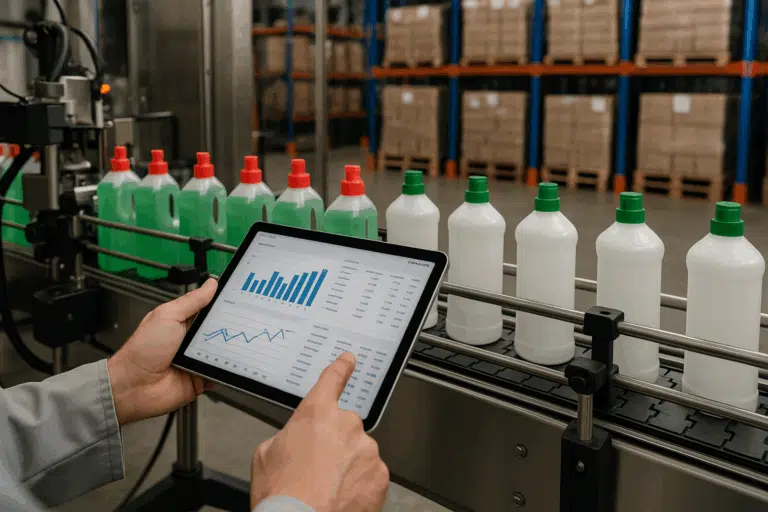RFID and NFC technologies are revolutionizing supply chain management by providing real-time tracking and data insights. How to Leverage Plan For Every Part of Supply Chains involves integrating these technologies to enhance inventory visibility, streamline logistics, and improve operational efficiency. With RFID tags and NFC-enabled devices, businesses can monitor the movement of goods at every stage of the supply chain, from production to delivery, optimizing processes and minimizing errors. Embracing these innovations empowers companies to make informed decisions, reduce costs, and deliver superior customer experiences, ultimately driving competitive advantage in today’s dynamic marketplace.
CPCON is a leading provider of cutting-edge RFID and NFC solutions, playing a pivotal role in transforming supply chain management. How to Leverage Plan For Every Part of Supply Chains involves partnering with CPCON to implement advanced technology solutions tailored to specific business needs. With CPCON’s expertise, companies can deploy RFID and NFC systems to track assets, manage inventory, and optimize workflows with precision and efficiency. By harnessing CPCON’s innovative solutions, organizations can gain a competitive edge in today’s fast-paced market by enhancing visibility, reducing costs, and improving overall operational performance.
Table of Contents
ToggleKey Takeaways
- RFID and NFC technologies significantly enhance supply chain visibility, accuracy, and operational efficiency.
- Implementing RFID can streamline inventory tracking, while NFC enhances customer interaction and transaction security.
- Integration of these technologies involves careful planning, addressing data security, and overcoming hardware and software challenges.
- Real-time data provided by RFID and NFC can dramatically improve decision-making and asset management in supply chains.
- Future advancements in RFID and NFC are expected to further revolutionize supply chain management, making processes even more efficient and adaptable.
The Basics of RFID and NFC in Supply Chain Automation

At CPCON, we recognize the critical role that foundational technologies like RFID (Radio Frequency Identification) and NFC (Near Field Communication) play in modern supply chain automation. These technologies not only enhance operational efficiency but also provide the accuracy and real-time data crucial for effective supply chain management.
| Aspect | RFID | NFC |
|---|---|---|
| Range | Up to 100 meters | Up to 20 centimeters |
| Primary Use Cases | Inventory management, asset tracking | Contactless payments, access control |
| Data Transfer Rate | Moderate to High | Low |
| Tag Cost | Varies (depending on type) | Generally lower |
| Interference | Affected by metals and liquids | Less susceptible |
Understanding RFID and NFC Technologies
RFID (Radio Frequency Identification) and NFC (Near Field Communication) are both wireless communication technologies used for data exchange, but they operate differently. RFID relies on radio waves to transfer data between a reader and a passive or active tag attached to an object. How to Leverage Plan For Every Part of Supply Chains involves utilizing RFID for long-range tracking and identification, making it ideal for inventory management and asset tracking in large-scale operations. On the other hand, NFC operates over shorter distances, typically within a few centimeters, enabling devices to communicate when in close proximity. How to Leverage Plan For Every Part of Supply Chains includes leveraging NFC for contactless payment systems, access control, and interactive marketing, offering convenience and security in various applications. Despite their differences in range and functionality, both RFID and NFC technologies play integral roles in optimizing supply chain processes and enhancing overall efficiency.
Benefits of RFID and NFC for Supply Chain Management
RFID and NFC technologies enhance visibility by providing real-time tracking and monitoring of assets throughout the supply chain, enabling businesses to gain insights into inventory levels, shipment statuses, and operational workflows. By automating data capture processes, these technologies improve accuracy by reducing manual errors and ensuring the integrity of information exchanged between systems. How to Leverage Plan For Every Part of Supply Chains involves leveraging RFID and NFC to streamline operations, optimize resource allocation, and minimize delays, leading to greater efficiency and cost savings. With enhanced visibility, accuracy, and efficiency, organizations can respond promptly to changing market demands, mitigate risks, and deliver superior customer experiences, ultimately driving success in today’s competitive landscape.
Implementing RFID and NFC Solutions

Implementing RFID and NFC in your supply chain is a strategic move towards enhanced efficiency and accuracy. At CPCON, we guide our clients through every step—from defining clear objectives and conducting a needs assessment to selecting the right systems and deploying them effectively.
How to Implement RFID in Your Supply Chain in 10 steps
- Define Objectives: Clearly outline your goals for integrating RFID technology, such as improving inventory accuracy, reducing costs, or enhancing customer experiences.
- Conduct Needs Assessment: Assess your current supply chain processes and identify areas where RFID can add value, such as inventory management, asset tracking, or order fulfillment.
- Select RFID System: Research and select the RFID system that best fits your requirements, considering factors such as read range, tag type, and compatibility with existing systems.
- Design Tagging Strategy: Develop a tagging strategy to determine which items will be tagged, where tags will be placed, and what information they will carry, ensuring optimal performance and cost-effectiveness.
- Procure Hardware and Software: Procure RFID hardware (readers, antennas, and tags) and software (middleware, inventory management systems) from reputable vendors that align with your requirements and budget.
- Plan Deployment: Develop a deployment plan outlining the implementation timeline, resource allocation, and training requirements for staff involved in RFID integration.
- Pilot Testing: Conduct pilot tests in a controlled environment to evaluate the effectiveness and reliability of the RFID system, making adjustments as needed before full-scale deployment.
- Deploy RFID System: Roll out the RFID system across your supply chain, following the deployment plan and ensuring proper installation and configuration of hardware and software components.
- Train Staff: Provide comprehensive training to employees on how to use RFID technology and incorporate it into their daily workflows, emphasizing its benefits and best practices for maximizing efficiency.
- Monitor and Optimize: Continuously monitor the performance of the RFID system, collecting data on key metrics such as read rates, inventory accuracy, and process efficiency. Use this data to identify areas for improvement and optimize the system accordingly.
Integrating NFC for Enhanced Interactions
NFC technology finds various applications in supply chain contexts, primarily in inventory management, authentication, and product traceability. How to Leverage Plan For Every Part of Supply Chains entails using NFC tags to track products from manufacturing to distribution, allowing for seamless inventory monitoring and management. Additionally, NFC enables secure authentication of products, safeguarding against counterfeiting and ensuring product integrity throughout the supply chain. Moreover, NFC facilitates direct customer interactions by enabling smart packaging solutions, such as interactive labels or tags that provide product information, usage instructions, and even promotional offers when tapped with a smartphone.
This enhanced customer engagement not only fosters brand loyalty but also provides valuable insights into consumer behavior and preferences, enabling companies to tailor their offerings and marketing strategies accordingly. By leveraging NFC technology in supply chain management, businesses can enhance operational efficiency, ensure product authenticity, and deliver personalized customer experiences, ultimately driving growth and competitive advantage in today’s market.
Advanced Applications of RFID and NFC

As pioneers in RFID applications, CPCON is continually exploring advanced uses of RFID and NFC to push the boundaries of what’s possible in supply chain management. Our expertise enables us to leverage these technologies to deliver innovative solutions that address complex challenges.
Some Advanced Applications of RFID and NFC:
- Healthcare: Patient tracking, medication administration, and equipment management.
- Retail: Inventory management, theft prevention, and customer engagement through smart fitting rooms.
- Manufacturing: Tracking parts and tools, monitoring production processes, and ensuring quality control.
- Logistics: Real-time shipment tracking, route optimization, and automated warehouse management.
Real-Time Inventory Tracking
RFID and NFC technologies have the potential to revolutionize inventory management by providing real-time data accuracy throughout the supply chain. How to Leverage Plan For Every Part of Supply Chains involves deploying RFID and NFC tags on inventory items, enabling automated tracking and monitoring of stock movements from production to distribution. This continuous data capture ensures accurate inventory counts, reduces the risk of stockouts or overstocking, and minimizes manual errors associated with traditional inventory methods.
With real-time visibility into inventory levels and locations, businesses can optimize stock replenishment, streamline order fulfillment processes, and improve overall operational efficiency. By leveraging RFID and NFC for inventory management, companies can enhance inventory accuracy, increase productivity, and ultimately deliver better customer experiences, driving competitiveness and growth in today’s dynamic market landscape.
Enhancing Warehouse Operations
RFID and NFC streamline warehouse management processes through various applications such as inventory tracking, asset management, and order fulfillment. RFID tags on pallets and products enable automated inventory tracking, reducing manual labor and improving accuracy. NFC-enabled devices facilitate quick identification of assets and equipment, enhancing asset management efficiency. Additionally, RFID and NFC technologies optimize order fulfillment by enabling real-time status updates and ensuring accurate picking and packing processes. Overall, leveraging RFID and NFC in warehouse management enhances operational efficiency, reduces costs, and improves customer satisfaction.
Overcoming Challenges

At CPCON, we’re committed to helping our clients overcome the challenges associated with integrating advanced technologies like RFID and NFC into their existing systems. We provide expert advice on navigating these hurdles, ensuring a smooth transition and optimal system performance.
Overcoming RFID and NFC Integration Challenges:
- High Initial Costs:
- Solution: Conduct a cost-benefit analysis to justify the investment.
- Compatibility Issues:
- Solution: Select hardware and software solutions that are compatible with existing systems.
- Data Security Concerns:
- Solution: Implement robust data encryption and access control measures.
- Employee Training:
- Solution: Provide comprehensive training programs for staff to ensure smooth adoption and use of the technology.
Addressing Integration Challenges
Common obstacles in integrating RFID and NFC technologies include initial implementation costs, compatibility issues with existing systems, and concerns regarding data security and privacy. To overcome these challenges, businesses can start by conducting a thorough cost-benefit analysis to justify the investment in RFID and NFC integration. Additionally, selecting compatible hardware and software solutions and working with experienced vendors can help mitigate compatibility issues. Implementing robust data encryption and access control measures can address security and privacy concerns, ensuring that sensitive information remains protected.
Furthermore, providing comprehensive training for employees and stakeholders on the use and benefits of RFID and NFC technologies can foster acceptance and adoption. By proactively addressing these obstacles, businesses can successfully integrate RFID and NFC into their operations, unlocking their full potential for improving efficiency and productivity in supply chain management.
Ensuring Data Security and Privacy
- Best practices for maintaining security when deploying RFID and NFC technologies.
Case Studies and Industry Examples

Through years of experience and numerous successful implementations, CPCON has gathered a wealth of case studies demonstrating the effectiveness of RFID and NFC technologies across various industries. These real-world examples highlight the significant improvements in efficiency and accuracy that can be achieved.
Success Stories from CPCON Implementations
CPCON has successfully implemented RFID and NFC solutions across various industries, showcasing their effectiveness in improving operational efficiency and customer experiences.
For instance, in the retail sector, CPCON deployed RFID tags and readers to enable real-time inventory tracking and reduce stockouts for a large clothing retailer, resulting in improved inventory accuracy and increased sales.
In healthcare, CPCON implemented NFC-enabled patient wristbands and mobile devices to streamline patient identification and medication administration processes in hospitals, enhancing patient safety and workflow efficiency.
Moreover, in logistics and transportation, CPCON integrated RFID technology into shipping containers and vehicles to optimize asset tracking and route management for a global logistics company, leading to cost savings and improved supply chain visibility.
These real-world examples highlight CPCON’s expertise in leveraging RFID and NFC technologies to address diverse business challenges and drive tangible results across different industries.
| Industry | Client | Solution | Outcome |
|---|---|---|---|
| Retail | Large Clothing Retailer | Real-time inventory tracking with RFID tags | Improved inventory accuracy and increased sales |
| Healthcare | Hospitals | NFC-enabled patient wristbands and mobile devices | Enhanced patient safety and workflow efficiency |
| Logistics | Global Logistics Company | RFID integration in shipping containers and vehicles | Optimized asset tracking and route management |
Comparative Analysis: RFID and NFC Impact Across Industries
Different sectors benefit from RFID and NFC technologies in various ways, tailored to their specific needs and operations.
In retail, RFID facilitates accurate inventory management, reduces stockouts, and enhances the overall shopping experience through efficient checkout processes and personalized marketing initiatives.
In healthcare, NFC-enabled devices improve patient safety by ensuring accurate medication administration and streamlining workflow efficiency through patient identification and medical records management.
In logistics and transportation, RFID enables real-time tracking of goods and vehicles, optimizing supply chain visibility, and enhancing route optimization and asset management.
Additionally, in manufacturing, RFID enhances production efficiency by tracking work-in-progress and monitoring equipment maintenance schedules, leading to reduced downtime and increased productivity. Across sectors, both RFID and NFC technologies drive operational excellence, improve data accuracy, and enable businesses to make informed decisions, ultimately enhancing customer satisfaction and driving competitive advantage.
Future Trends in RFID and NFC

Looking ahead, CPCON is at the forefront of exploring emerging trends in RFID and NFC technology. Our focus on innovation ensures that our clients are always equipped with the latest advancements to enhance their supply chain operations.
Innovations on the Horizon
Upcoming advancements in RFID and NFC technologies include enhanced integration with Internet of Things (IoT) platforms, enabling seamless data exchange between devices for more comprehensive supply chain visibility. Additionally, advancements in RFID tag miniaturization and NFC chip efficiency will further expand their application possibilities, particularly in wearable technology and smart packaging solutions. Moreover, developments in blockchain integration will enhance the security and transparency of data exchanged through RFID and NFC systems, fostering trust and accountability across supply chain networks. These advancements promise to revolutionize supply chain management, unlocking new opportunities for efficiency, innovation, and value creation across industries.
Predicting the Future of Supply Chain Automation
RFID and NFC will continue to play a pivotal role in shaping supply chains by driving increased visibility, efficiency, and innovation. With ongoing advancements in technology and decreasing costs, the adoption of RFID and NFC solutions will become more widespread across industries, enabling businesses to achieve greater transparency and control over their operations. Furthermore, integration with emerging technologies such as artificial intelligence and big data analytics will enable more sophisticated data-driven decision-making, leading to further optimization of supply chain processes. Moreover, as consumer expectations for transparency and sustainability rise, RFID and NFC will facilitate enhanced traceability and verification of product origins and sustainability credentials, fostering trust and loyalty among customers. Overall, RFID and NFC technologies will remain key enablers of agility, resilience, and competitiveness in the evolving landscape of supply chain management.
Get in touch for a free quote
RFID and NFC technologies offer key benefits and strategic importance in supply chain automation. Firstly, they provide real-time visibility and traceability of assets, improving inventory accuracy and reducing stockouts. Secondly, RFID and NFC streamline operational processes, such as order fulfillment and asset management, leading to increased efficiency and productivity. Thirdly, these technologies enhance customer experiences by enabling personalized interactions and ensuring product authenticity. Overall, RFID and NFC play a crucial role in driving operational excellence, cost savings, and competitive advantage in today’s dynamic supply chain landscape.
FAQs
What is the initial cost of implementing RFID/NFC in a supply chain?
Overview of budget considerations and potential ROI from RFID and NFC integration.
How long does it take to implement RFID/NFC solutions in a supply chain?
Timeline expectations for planning, deploying, and optimizing RFID and NFC systems.
Can RFID and NFC technologies be used in all types of supply chains?
Discussion on the versatility of RFID and NFC across various supply chain models and environments.
What are the best practices for maintaining RFID/NFC hardware and software?
Maintenance tips and strategies for ensuring long-term operational efficiency.
How does CPCON customize RFID and NFC solutions for different clients?
Explanation of CPCON’s approach to tailoring RFID and NFC solutions based on client-specific needs and industry requirements.



























